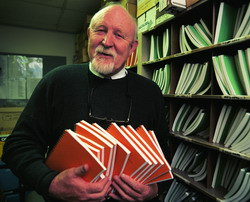Professor David Fergusson is retiring at the end of August after almost 40 years leading the influential HRC-funded Christchurch Health and Development Study (CHDS).
Professor Fergusson and his team have tracked the health and psychosocial development of more than 1000 children born in Christchurch in 1977. Evidence from the study has contributed to significant changes such as the removal of lead from petrol, laws requiring the fencing of residential swimming pools, and has enlightened debate by providing an evidence base on key social issues such as intervention for at-risk children, cannabis and other drug use, domestic violence, abortion and mental health, suicidal behaviour, and the later mental health impacts of childhood sexual abuse.
The longitudinal study, based at the University of Otago, Christchurch, is widely acknowledged as one of the best and most productive in the world.
Long-standing CHDS colleagues Associate Professors John Horwood and Joe Boden will lead the study after Professor Fergusson’s retirement.
Professor Fergusson says one of the key tasks of Associate Professors Horwood and Boden will be to extend a HRC-funded study into the psychological effects of the Canterbury earthquakes. They are in a unique position to gather facts as just over half of CHDS participants were in Canterbury for the majority of the earthquakes, providing an ideal basis for comparison. Early data shows those who suffered greatest ‘shaking and breaking’ during the major earthquakes have struggled most to deal with ongoing earthquake-related problems such as difficulties with insurers.
Professor Fergusson says he is very grateful for the support of the HRC and its predecessor the Medical Research Council, who have been almost the sole source of funding for the study since its inception in the 1970s.
Photo and news article courtesy of the University of Otago, Christchurch
